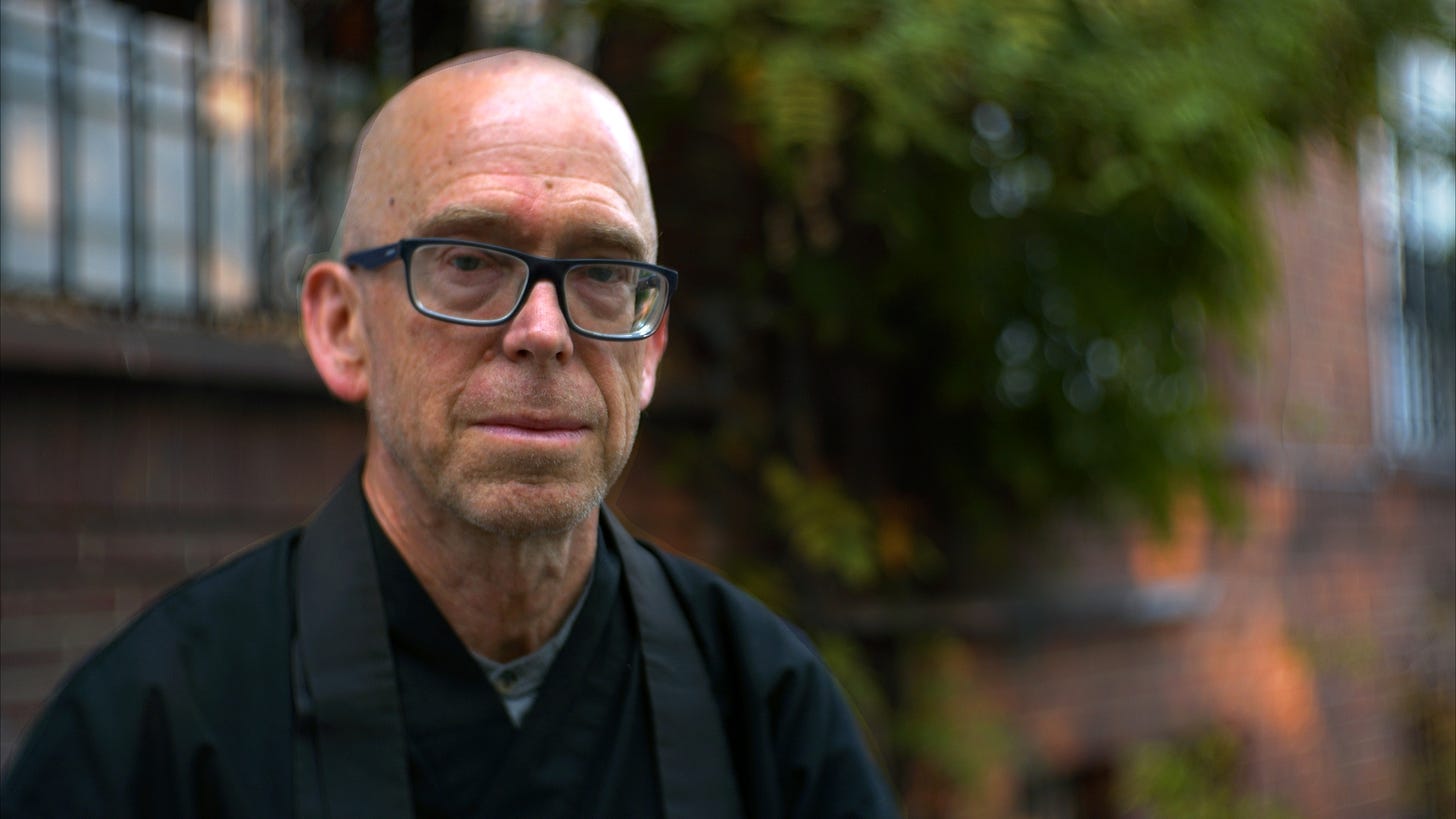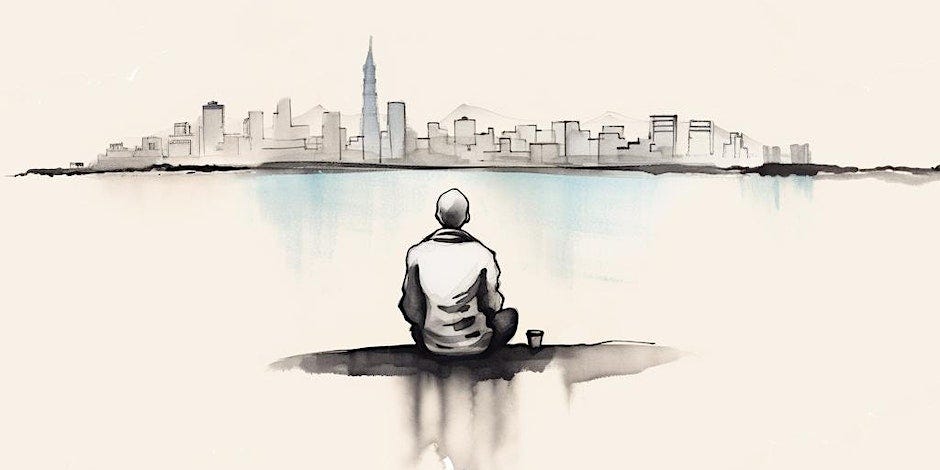The Problem with Zen Practice...
An interview with Ainshi Zachary Smith
Anshi Daigi Zachary Smith is a legitimate Zen master. He has been practicing Zen since 1993. He took jukai in 1995, was Shuso (Head Student) in 2007, ordained as a Zen priest in 2014 and received Dharma Transmission on April 17, 2019, all with former SFZC abbot and Senior Dharma Teacher Ryushin Paul Haller.
However, despite the formality and length of his credentials, he is not a mountain-dwelling dispenser of cryptic statements. Through his teaching, he makes Zen clear and accessible. He sat with me to talk about the approach he’s taking to bringing Zen to the Alembic every Monday night. Zachary is devoted to making Zen a realistic, pragmatic practice for those who can’t go to a monastery, but still want to wake up in the middle of everything.
–Sasha Chapin
SC: The subtitle of your class is “Zen for Today.” What does Zen have to offer in this moment, specifically?
AZS: All I can do is start with my experience, right? My experience is this.
I was sort of a second-generation convert Buddhist. My mom was a practitioner in the late 60s and early 70s, and she gave me a copy of Shunryu Suzuki’s classic Zen Mind, Beginner's Mind, right after it was written. We were also pals with Alan Watts, so I spent a lot of time sitting around listening to my parents and the Wattses talk about Zen and spiritual practice more broadly, and so on. And at various times, my parents were both Buddhists of various sorts.
Twenty-some years later, I sat down and did this sort of bulleted list that described my life. I held it up, and I was like, this is the ideal life. And then I spent a bunch of time sampling what it felt like and realized that I was really screwing it up, basically. And that I was being a total jerk to a lot of people whose view I really cared about, and so on and so forth. And I thought, well, I know what I'll do. I'll fix it with Zen practice.
I started going to Zen Center and sitting. So far, it hasn't offered me any of the things that I expected it to offer, but the end result has been kind of wonderful. I would say that the baseline of the mind that comes into view as a result of diligent practice has a kind of unconditioned appreciation for just the fact of being alive. It offers a kind of opening for skill and comfort with the human condition that I would never have expected.
My guess is that that's always been true of this kind of practice and that it's as relevant now as it ever was. And certainly, we could use more people who have comfort and skill with the human condition and have an unconditioned appreciation for the act and fact of being alive, right? So, that's what it has to offer.
The “for today” part may have more to with how to frame this practice in the context of contemporary life, which is a not inconsiderable difficulty in some ways.
If you look at places that are traditionally Buddhist, the people who are doing most of the practice are people who have, to one degree or another, separated themselves from everyday society. That model obviously isn't going to work in the Bay Area and probably not really anywhere in the U.S., right?
I've been, for years, hosting zazen meditation instruction at San Francisco Zen Center, many Saturday mornings. Inevitably, through the door, like clockwork, come somewhere between ten and thirty people who, when you ask them what they're there for, say, well, I want to live a life that feels more comfortable and skillful and is a little quieter and offers more opportunities for appreciation and enjoyment, right? Yeah, wonderful, right? But none of them are going to run off to a monastery.
They're all deeply embedded in a work life that's really involving and important for them, and in fact, important in sort of a bigger context as well. So, how do you offer practice to people like that? Well, for me, the entire time I've been practicing Zen Buddhism, I've also been working, and I've had a family. So, it's definitely possible, but it’s a lot of work. It involved things like when I was head monk at San Francisco Zen Center, I would get up at 3.30 in the morning, ride my bike to the Zen Center, do a bunch of stuff, and then take the train to San Jose and work a full day at a tech job in San Jose, and then get home between 9.30 and 10 o'clock. My family typically left out a sad little plate with a bowl over it to keep it warm, so I could sit down and stuff some food in my mouth, and then go to bed and turn around and get up and do again at 3.30 the next morning. My guess is that it's too much work and that there's a better way to do it.

SC: Any preliminary intuitions about how to cut down the workload?
AZS: So for the last almost fifteen years I've been running a daily Zazenkai group, which is to say a group of people who are practicing together, but not formally. Very few of them have done really any intensive practice in the sense of going off on retreats or living at monasteries for a while, and interestingly, the ones that have done the intensive practice are not necessarily the ones that have stuck around for the daily sitting.
I did it because I wanted to embed sitting practice in the neighborhood and have it focus largely on people who could get up in the morning and walk to the place to sit. I wasn't really sure what to expect from it, personally. My experience has been that after fifteen years of practicing like that and having that be in some ways my primary practice, it's really made a huge difference.
There’s this idea that's sort of inherent in the Chinese Zen literature. The idea is that we have two major modes of engagement with the world. There's one sort that involves conventional thinking, self-narration, and self-construction. It uses our long-range planning capacity to grasp after things that we want and avert from things that we don't want, and so on. And then there's another mode that really isn't concerned with any of that, right? It doesn't even make a big deal of the separation between this self, which is in some ways largely a construct of the first, and other selves, and doesn't necessarily symbolicate every perception that comes over the transom.
If you read the literature about this, it says you basically discover the truth of this as a result of practice. Over time those two modes become more and more integrated so that the apparent barrier between them, which you think is in place when you first start practicing, actually kind of disappears. And my experience is that regular, unloaded, not particularly formal practice transforms that relationship between those two modes a lot, and makes for a much greater sense of continuity and ease of passage between the two modes.
I have gone off to monasteries and spent months in retreat over the course of the last thirty years or so. But this particular practice has been transformative without that stuff. It’s true that you might get a clearer idea if you're sitting in a seven-day sesshin at a monastery. But it sneaks up on you in another way when you're just doing regular, unloaded practice. It's actually quite wonderful.
And so that's one thing. If it's just possible for people to establish a regular practice in their lives that they carry out in a way that's not too encumbered by spiritual ambition, it actually works pretty well.
SC: Spiritual ambition is an interesting topic. It seems like it is often what motivates people towards deep practice, but is itself a product of the mind that you're seeking to address with deep practice.
AZS: Yeah, that's an apparent paradox that's been a part of Buddhism for as long as we have literature that describes what people were thinking as Buddhists. And if you read Zen Mind Beginner's Mind by Suzuki Roshi, it's no different. He says it in the preface. He says, here's the problem with Zen practice.
You need to have “way-seeking mind” in order to do it, and at the same time, if you have all these ideas about gain and loss in the process of practice, it's a barrier, right? And the hard part about practice is keeping your natural human tendency to evaluate, rate, and pursue disentangled from your practice, when in fact, you can't keep it disentangled from your practice.
The reason why this is not a paradox is that experientially, you can be suffused with powerful spiritual ambition at time T and literally a second later have it all go away. It’s just completely let go, because of how we're built.
And you're like, oh, look at that. But it takes a while.
In a slightly larger view, we live our entire lives in this tangle between what people conventionally think of as the relative and the absolute. Like between the conventional mode of being and this other mode of being. In Dongshan's five ranks, they're called the crooked and the straight, or the leaning and the upright, or something like that. We live our lives in this tangle between them, where they influence each other and where they're impossible to tease apart.
Given that this is true, the ideas that we have are always going to affect our engagement and experience and vice versa—our experience, hopefully, is also going to modify the terms of engagement from the other side. In the end, the fact that this is ultimately not a problem can only sneak up on you. You can't make it happen.
I can say all these words, right? And those words probably make sense, you know, to a certain extent, but you have to recognize it in your own body when you see it. It turns out it's not a problem to both be filled with bodhicitta and also not have any gaining idea.
TRANSMUTATIONS is a biweekly publication from the Berkeley Alembic, a transformational bodymind center that offers classes, workshops, retreats, and warm cups of tea.



